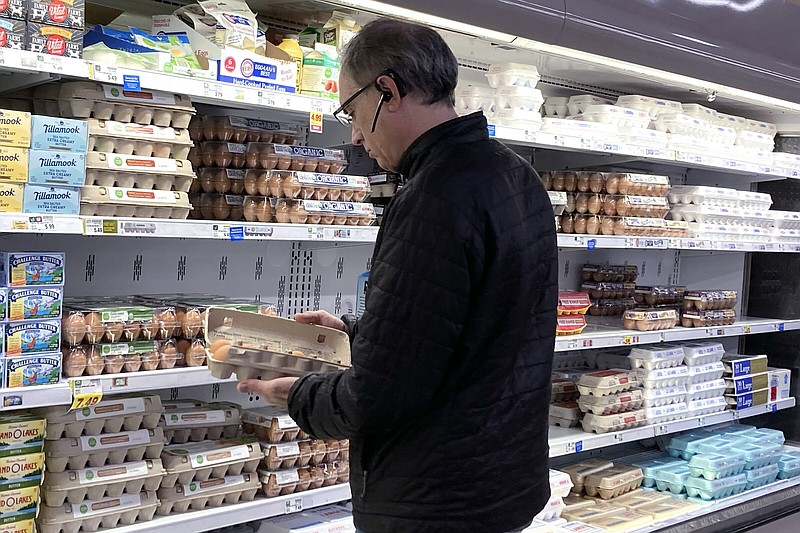With egg prices more than doubling in the past year, calls are coming for an investigation into possible price gouging.
U.S. Sen. Jack Reed, D-R.I., has asked for the Federal Trade Commission to investigate whether egg prices have been improperly manipulated by producers.
A farmer-led advocacy group called Farm Action made a similar request last week arguing there "appears to be a collusive scheme among industry leaders to turn inflationary conditions and an avian flu outbreak into an opportunity to extract egregious profits."
The spike in U.S. egg prices -- even leading to more eggs being seized as contraband at the U.S.-Mexico border -- has been attributed to the millions of chickens slaughtered to limit the spread of bird flu, as well as farmers having to compensate for inflation driving up production costs.
But even though roughly 43 million of the 58 million birds slaughtered over the past year to help control bird flu have been egg-laying chickens, the size of the total egg-laying flock has only been down 5% to 6% at any one time from its normal size of about 320 million hens.
The national average retail price of a dozen eggs hit $4.25 in December, up from $1.79 a year earlier, according to the latest U.S. government data.
"At a time when food prices are high and many Americans are struggling to afford their groceries, we must examine the industry's role in perpetuating high prices and hold those responsible accountable for their actions," Reed said in a letter Tuesday to the FTC.
But trade groups say egg prices are largely determined by commodity markets. Experts, meanwhile, say the bird flu outbreak -- combined with the skyrocketing costs of fuel, feed, labor and packaging, and a healthy demand for eggs -- is the real culprit for the price increases.
"Current egg prices reflect many factors, most of which are outside the control of an egg farmer," said Emily Metz, president and CEO of the American Egg Board trade group.
Purdue University agricultural economist Jayson Lusk said "in my view, the basic economics of the situation well explain the price rise." He said small reductions in egg supply can result in large price increases because consumer demand for eggs doesn't waiver much.
The FTC didn't immediately respond to questions about the egg price-gouging concerns, but the agency doesn't generally comment on outside requests for investigations.
The largest U.S. producer of eggs, Cal-Maine Foods, was singled out by Reed and the Farm Action group because the company reported last month its quarterly sales had jumped 110% to $801.7 million on the back of record egg prices, helping the company generate a $198.6 million profit, up from just $1.1 million a year earlier.
The Ridgeland, Miss.-based company said it "wants to assure its customers we are doing everything we can to maximize production and keep store shelves stocked" and the "domestic egg market has always been intensely competitive and highly volatile even under normal market circumstances."
The prices Cal-Maine Foods charges its customers are determined by negotiations with the grocery store chains, club stores and distributors to which the company sells. Cal-Maine Foods said its prices averaged $2.71 a dozen in the most recent quarter.
That's almost double the $1.37 the company was getting a year earlier, but still much lower than consumer prices.
THE LATEST CONTRABAND
From California to Texas, border agents are increasingly seizing a surprising type of contraband from Mexico: eggs.
U.S. Customs and Border Protection agents had some 2,000 encounters with people trying to bring eggs to the United States from Mexico between Nov. 1 and Jan. 17, an agency spokesperson said.
In the same 11-week period a year earlier, there were about 460 such encounters.
Roger Maier, Customs and Border Protection spokesperson, said in an email Tuesday that the agency had noted an increase in people attempting to bring eggs to the United States from Mexico, where "they are significantly less expensive."
The 2,000 encounters involving eggs were reported by field offices in San Diego; Tucson, Ariz.; Laredo, Texas; and El Paso, Texas.
Customs and Border Protection officials in San Diego and El Paso issued warnings on Twitter last week to remind people they were not allowed to bring uncooked eggs from Mexico into the United States.
At grocery stores in Mexico last week, the wholesale price for a kilogram of eggs, which is more than a dozen jumbo eggs, was between about $1.59 and $2.71, according to figures collected by the Mexican government.
People entering the United States are required to declare to border officials if they have items including meat, fruit, vegetables, animals and seeds in their luggage or vehicle.
If these types of items are found as undeclared, travelers can face civil penalties of up to $1,000. Fines are much higher if the items are found to be intended for commercial use. Maier urged travelers to declare food and agricultural items, even those they believe are allowed, to avoid potential penalties.
Information for this report was contributed by Josh Funk of The Associated Press and Amanda Holpuch of The New York Times.
